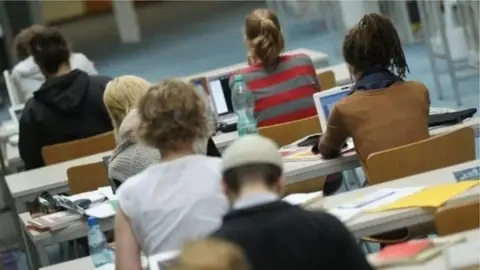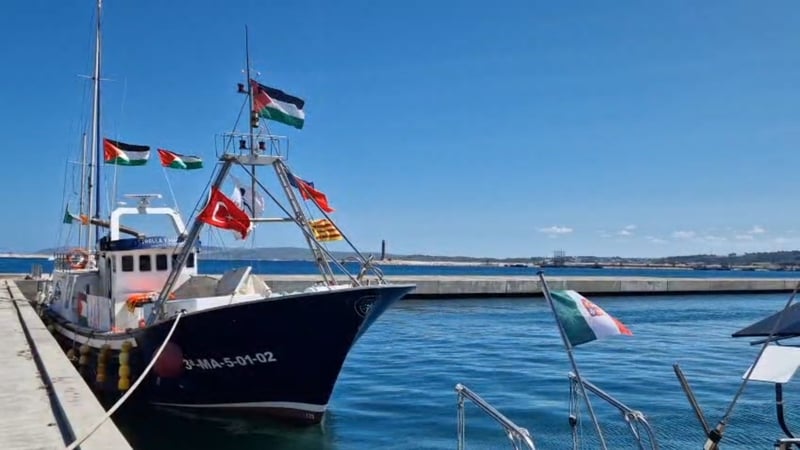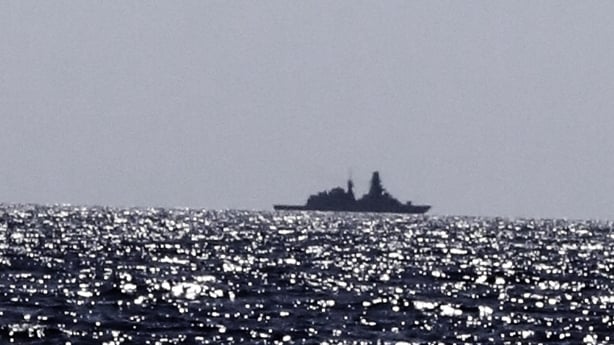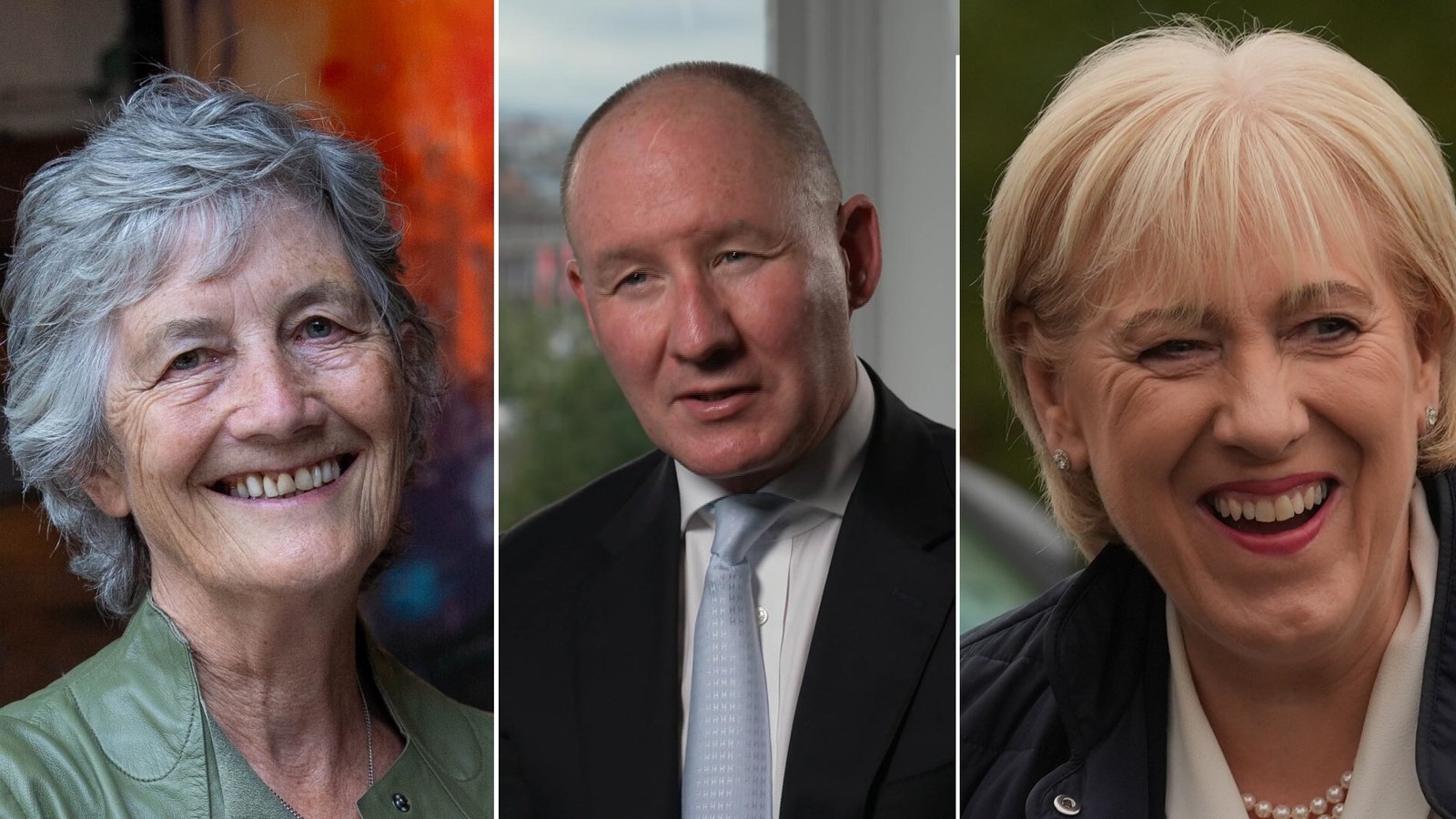Breaking News
Govt to study 100% US tariff on branded pharma imports

This post was originally published on this site.
Tánaiste Simon Harris has said the Government will study a new tariff of 100% on branded pharmaceutical imports from companies that are not building manufacturing plants in the US.
Making the announcement overnight, US President Donald Trump said beginning 1 October, the US will levy a 100% tariff on “any branded or patented pharmaceutical unless a company is building their pharmaceutical plant in America”.
He defined building a plant as “breaking ground and/or under construction”.
In August, the Trump Administration imposed a 15% tariff on most pharmaceutical exports from the European Union.
In a statement this morning, Mr Harris said the 15% cap on pharmaceuticals remains the case.
He said: “We will be studying the impact of this announcement, which includes a number of exemptions, together with EU colleagues.
“I want to stress, however, that the EU and US Joint Statement issued on 21 August last made absolutely clear that any new tariffs announced by the US on pharmaceuticals under its Section 232 investigation would be capped at 15% for pharma products being exported by the EU.
“This remains the case and underlines again the value of the agreement reached last month.”
A European pharmaceutical industry group warned that tariffs on medicines “would create the worst of all worlds”.
“Tariffs increase costs, disrupt supply chains and prevent patients from getting life saving treatments,” Nathalie Moll, director general of the European Federation of Pharmaceutical Industries and Associations, said in a statement.
Ireland is one of the biggest exporters of pharmaceutical products to the US from the EU, accounting for €33bn of €120bn of pharmaceutical exports to the US last year.
President Trump also announced a 50% tariff on kitchen cabinets and bathroom vanity units, which he said were “flooding into the country”, and had to be controlled for “national security” and other reasons to protect the US manufacturing base.
Similar reasons were cited for imposing a 25% tariff on heavy trucks imported into the US market.
Additional reporting by AFP.
Breaking News
Most Scottish colleges not sustainable, says report

Read more on post.
Douglas FraserScotland business/economy editor
 Getty Images
Getty ImagesMost Scottish colleges face unsustainable losses over the next three years – and several are warning they could run out of cash by the end of this financial year, according to a new report.
The Scottish Funding Council (SFC) study, which has had access to accounts and forecasts, shows a further education sector in crisis, with 22 out of 24 colleges expected to spend more than their income this year.
“These deficits show that most colleges are not sustainable,” it says.
Meanwhile, a separate report into Scotland’s universities says they have become over-reliant on income from foreign students and they are at risk if numbers drop.
The SFC monitors and assesses the financial health of Scotland’s further education colleges and universities.
It also distributes funds for Scottish students on behalf of the Scottish government.
Colleges remain highly dependent on the SFC grant, which accounts for more than three-quarters (77%) of their income.
This contrasts with the university sector, which was only reliant on SFC grants for 24% of its income last year, and that number is reducing.
The report says the grant from the funding council has remained relatively flat whereas other costs have soared, such as annual pay awards for staff and rising employer National Insurance contributions and pensions.
Staff costs represent the largest expense for colleges at just under 70% of total costs so this the area they focus on as they urgently try to balance their budgets.
The SFC says further cuts will have a profound impact on the college curriculum, the quality of courses, staff numbers, student numbers, morale and local communities.
An increasing number of colleges have reported that continued savings of that scale will not be achievable, it says.
Most colleges spending more than they earn
According to the funding council report, 17 of Scotland’s 24 FE colleges were in deficit last year, meaning they spend more than they earn.
The forecast for this financial year expects that number to increase to 22.
Twenty of the colleges are still expected to be in deficit in three years’ time.
Another important indicator of a college’s short-term viability is the amount of cash they have in their accounts.
Last year and the year before, the sector as a whole had a cash surplus of £130m.
That is forecast to fall to £35m at the end of this year, and then to go negative by £46m by 2028.
The report says “this reflects colleges’ weak operating position, and there is an imminent risk of several colleges becoming insolvent” by the end of this financial year.
Four colleges expect to have negative cash balances by next April, rising to 12 of them by April 2027.
 Getty Images
Getty ImagesThe report offers limited information about the colleges facing the most financial difficulties.
It reports on published accounts up to 2023-24, which indicate that several of the biggest operating deficits, adjusted for exceptional costs, were in colleges that form the University of the Highlands and Islands.
Perth had an operating deficit of £1.8m, Shetland College was at £1.5m and Moray College was above £1m, with Orkney not far behind.
The Scottish Funding Council says colleges are responding to the pressures with restructuring plans, but have to find money for voluntary redundancies from their own, limited resources.
It says they are cutting teaching time and increasing class sizes, as well as cutting courses with low demand and trying to win more training income from employers.
It says that, on current forecasts, 667 full-time jobs, or their part-time equivalent, will have been cut over four years from 2024, which is one in 15 college staff.
What do Scotland’s colleges say?
Gavin Donoghue, the chief executive of Colleges Scotland, said they had been warning about the chronic underfunding of colleges for years but this report made especially grim reading.
“Colleges have already had investment in them reduced by 17% in real terms since 21/22,” he said.
“They’ve taken difficult and often unpalatable decisions to reduce their staff headcount and reduce the amount of students that they teach and are now looking at decisions like closure of campuses and courses.
“There is no single silver bullet that an individual college can take, its clearly a systemic problem that requires sustainable Scottish government funding.”
Universities ‘over-reliant on foreign students’
Meanwhile, a separate SFC report on Scottish universities said they were over-reliant on foreign students as a source of income.
It said universities get more money from teaching overseas students than they do in funding for Scottish students but there is an increasing risk that they may not be able to maintain the numbers who come from abroad.
The report says competition from other countries, UK visa and immigration policy and geopolitical changes could easily impact their ability to attract foreign students.
The SFC report on universities also says:
- Eleven of Scotland’s 18 universities are expecting to spend more more than they earn this year
- This is expected to lead to a total deficit of £12.9m this year
- The deficit is mainly due to low growth in tuition fees, reduced other income and increased staff costs due to pay inflation.
- The forecast for 2026 shows universities returning to surplus and just seven running a deficit
- However, improvement is mainly driven by three universities, and due to more optimistic forecasts for tuition fees and research income – offset by smaller increases in staff costs
The SFC report says international tuition fee income is now essential for universities to remain financially sustainable and it supports other areas such as research which is often loss-making.
However, the report warns that foreign income is an area of significant fluctuation and risk, especially when it is heavily weighted to a single country.
China remains the country with the most foreign students in Scotland, followed by India, the United States, Nigeria and Pakistan.
Nigeria saw a massive rise in student numbers post-Covid but has since dropped back.
 Getty Images
Getty ImagesEarlier this year, a report into the financial crisis at Dundee University said it had continued with increased spending despite a large drop in foreign student fee income.
The university needed a £40m government bailout after it almost collapsed financially.
The SFC report excluded Dundee because it has not yet finalised its accounts.
It is an extreme example but other Scottish universities are also under financial strain.
Edinburgh University’s principal has called for a “radical re-wiring” to respond to the funding challenge.
On Thursday, Glasgow University principal Anton Muscatelli called for a review of the funding and warned against “stumbling from year to year”.
His statement came as analysis seen by the BBC suggested Scottish government finance for universities and further education colleges has been squeezed in real terms in the past six years by about a fifth, due to the effect of inflation.
The study by David Bell, a professor of economics at Stirling University and expert in public finance, also used publicly available data to show that the fees universities receive for Scottish students fall far short of what they estimate are the costs of educating them.
For instance, in modern languages, the £7,421 annual funding per student is half of what they say is required.
In dentistry, the Scottish government last year paid £19,580 per student.
This is reckoned to be at least £9,000 short of the cost to universities.
Claire McPherson, the director of Universities Scotland, which represents Scotland’s higher education institutions, said the report sets out the “starkest set of financial figures we have ever seen for Scotland’s universities”.
Ms McPherson’s said the report sounds “loud and clear” the financial warnings but there were important things that it does not say.
“It doesn’t mention job losses, which is the painful reality in many institutions,” she said.
“It also doesn’t reference a decade-long decline in public funding as the major contributing factor to the level of financial exposure institutions face and the hard choices they are forced to take.”
She said it was absolutely vital that Scotland makes a move to put its universities on a sustainable financial footing for the long-term.
Breaking News
Aid flotilla to enter international waters towards Gaza

Read more on post.
An international aid flotilla was set to leave Greek waters and head towards Gaza, organisers said, defying warnings from Israel that it would use any means to block the boats’ access to the war-torn enclave.
The Global Sumud Flotilla is using about 50 civilian boats to try to break Israel’s naval blockade of Gaza, an initiative Israel strongly opposes.
Many lawyers, parliamentarians, and activists, including Swedish climate campaigner Greta Thunberg, are on board.
A number of Irish activists as well as politicians are also part of the group.
No one was hurt, but Italy and Spain have dispatched naval ships to provide assistance to their and other European citizens on the flotilla.
Greece said it would guarantee the safe sailing of the flotilla off Greece, but the launch will take the flotilla back into international waters in the eastern Mediterranean.
Organisers said the boats aim to arrive early next week.
Israel, which has imposed a naval blockade on Gaza, said the flotilla will not pass and that the project will only assist Hamas.
The flotilla has blamed Israel for the drone attack. Israel’s foreign ministry did not respond directly to the accusation, but invited the flotilla to drop humanitarian aid for Israel to take to Gaza, or face consequences.
The exact timing of the departure from Greece is unclear.

Organisers said that one of its lead boats had suffered a mechanical failure but that it was still preparing to depart.
“We are not just delivering humanitarian aid. We are trying to deliver hope and solidarity, to send a strong message that the world stands with Palestine,” Ms Thunberg said from the deck of a boat off the Greek island of Crete yesterday.
Italy had proposed a compromise whereby aid supplies could be dropped off in Cyprus and handed over to the Catholic Church’s Latin Patriarchate of Jerusalem, which would then distribute it in Gaza.
Israel said it backed the idea but the flotilla rejected it.
Italy’s foreign ministry has sent a message to Italian members of the flotilla warning them against continuing with the mission, and offering help with repatriation if they choose to disembark in Greece.
It said the navy ship it has deployed would intervene only for sea rescue or humanitarian operations, and would “under no circumstances” engage in defensive or offensive military manoeuvres against anyone.
“Whoever (continues with the mission) takes on all risks and is personally responsible for them,” the ministry told activists.
Israel launched its nearly two-year-old war in Gaza in response to the 7 October, 2023, attacks on the country by Hamas militants which killed some 1,200 people and saw 251 taken hostage, according to Israeli tallies.
Since then, the Israeli offensive has killed more than 65,000 Palestinians, according to Hamas run health authorities in Gaza, destroyed most buildings, and displaced the population, in many cases multiple times, while famine has taken hold in parts of the territory.
Breaking News
Presidential candidates meeting voters in Donegal, Kerry

This post was originally published on this site.
The candidates in the Presidential Election are canvassing in counties Donegal and Kerry.
Independent candidate Catherine Connolly will be in Co Donegal, where she will visit Donegal town, Killybegs, An Clochán Liath and Ardara.
Ms Connolly is backed by a coalition of left-wing parties, including Sinn Féin.
Sinn Féin’s finance spokesperson and local TD Pearse Doherty is expected to canvas with her during her visit to his constituency.
Fine Gael’s candidate Heather Humphreys and Fianna Fáil’s Jim Gavin will be canvassing in Kerry.
Both Ms Humphreys and Mr Gavin will attend the Listowel Races in the afternoon.
Mr Gavin will also canvas in the Tralee area before visiting the Tralee Bay Wetlands Eco Park, where he will speak with journalists.
Ms Humphreys is expected to board a jaunting car in Killarney, visit Muckross House and then go on to visit Tralee Women’s Shed.
Speaking on Radio Kerry, Ms Humphreys said her campaign is “going well,” and said she has been meeting and talking to people and is getting the chance to outline to them her “vision” for the presidency.
She said that if elected president, she would “put a strong focus on community” and also said she would seek to unite people.
Ms Humphreys said community is close to her heart and it is “so important” that volunteers be recognised.
“I’ve seen them across the country, they are the people who hold our community together, you see them in the GAA, you see them in the Tidy Towns, the Men Sheds, the Women Sheds, the youth clubs, they’re all out working in their development associations, they’re doing so much for this country,” she said.
Ms Humphreys encouraged them to “keep going” and said they should never be taken “for granted,” and she wants to support them in every way that I can”.
She added that the first role of the President is to “protect and respect the Constitution,” and that if elected, it will be her priority.
Ms Humphreys said the Irish electorate are “very well informed”.
“Because they know the Presidential campaign is different, it’s about the person and it’s not about policies,” she said.
-
Politics3 days ago
European Parliament snubs Orbán with vote to shield Italian MEP from Hungarian arrest
-
Health4 days ago
EU renews support for WHO’s Universal Health Coverage Partnership
-
Culture3 weeks ago
Life, loss, fame & family – the IFI Documentary Festival in focus
-
Environment6 days ago
Key oceans treaty crosses threshold to come into force
-
Culture3 days ago
Twilight at 20: the many afterlives of Stephenie Meyer’s vampires
-
Culture1 week ago
Farewell, Sundance – how Robert Redford changed cinema forever
-
Culture2 months ago
Fatal, flashy and indecent – the movies of Adrian Lyne revisited
-
Culture3 weeks ago
What is KPop Demon Hunters, and why is everyone talking about it?











































